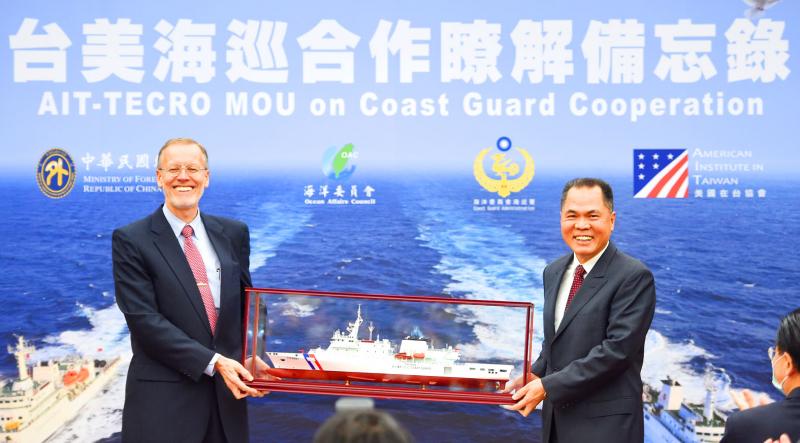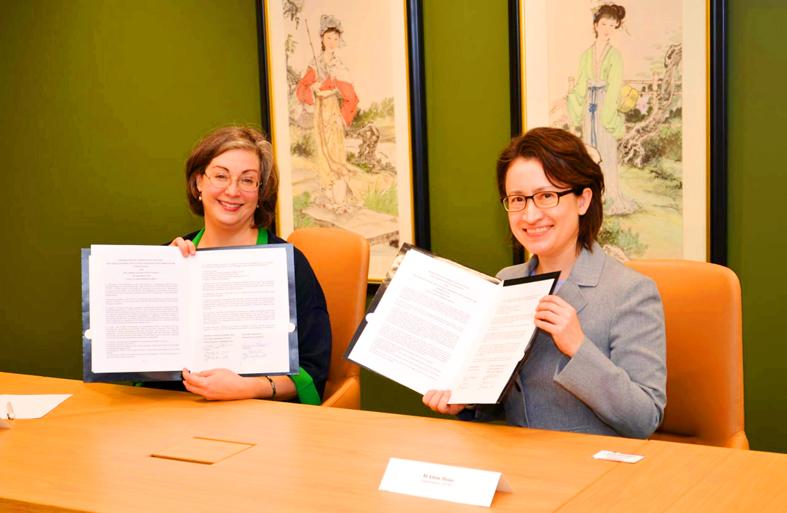Taiwan and the US on Thursday signed a memorandum of understanding (MOU) to establish a coast guard working group, the first official document inked by the two nations since US President Joe Biden took office in January.
The memorandum was signed by American Institute in Taiwan (AIT) Managing Director Ingrid Larson and Representative to the US Hsiao Bi-khim (蕭美琴) in Washington.
The memorandum “affirms a relationship with the common objectives of preserving maritime resources; reducing illegal, unreported, and unregulated fishing; and participating in joint maritime search and rescue as well as maritime environmental response events,” the AIT said in a news statement yesterday.

Photo: Liu Hsin-de, Taipei Times
“The United States supports Taiwan’s meaningful participation and contributions to issues of global concern, including in maritime security and safety, and in building networks to facilitate maritime law enforcement information exchange and international cooperation,” it said.
Based on the document, the two sides would establish a working group between Taiwan’s Coast Guard Administration (CGA) and the US Coast Guard (USCG) for communication and information sharing, and to build a stronger partnership on maritime rescue missions and maritime law enforcement, President Tsai Ing-wen (蔡英文) wrote on Facebook yesterday.
“We are of a maritime country, and ocean is inscribed in the DNA of Taiwanese,” Tsai said.

Photo courtesy of the Taipei Economic and Cultural Representative Office via CNA
As a responsible stakeholder of the Indo-Pacific region, Taiwan is willing to make more contributions in maritime affairs, and aims to defend a free and open Indo-Pacific region, she said.
Minister of Foreign Affairs Joseph Wu (吳釗燮) yesterday afternoon hosted a news conference in Taipei marking the signing of the document.
The signing of the memorandum shows that bilateral relations are “rock solid” and that there was no transition period to the new US administration, he said.
Connected to the world by ocean, Taiwan is committed to defending freedom, democracy and human rights with the US and other like-minded partners, he said, adding that the nation hopes to expand maritime cooperation with other countries as well.
“This MOU formalizes our already robust and longstanding cooperation with Taiwan’s coast guard,” AIT Director Brent Christensen said, describing Taiwan’s coast guard as “highly versatile in a variety of skills.”
Taiwan’s coast guard regularly takes part in training exercises at the US Coast Guard Academy, and it also invites USCG members to visit Taiwan to increase bilateral interactions, CGA Director-General Chou Mei-wu (周美伍) said.
Trained as a navy officer, Chou served as National Security Bureau special correspondent in Washington before he assumed his current position in January.
The CGA has been working to increase the coast guard’s capabilities to enforce maritime law and defend local fishers’ rights, Chou said, expressing the hope to work with more allies to defend stability in the region.
At the end of the news conference, Chou presented to Christensen a model of the new 4,000-tonne frigate Chiayi, which bears the name “Taiwan” in addition to the “Republic of China (ROC),” as instructed by Tsai.
The news conference was also attended by Japanese Representative to Taiwan Hiroyasu Izumi, British Representative to Taiwan John Dennis and Canadian Representative to Taiwan Jordan Reeves, as well as other foreign envoys.

A magnitude 5.6 earthquake struck off the coast of Yilan County at 12:37pm today, with clear shaking felt across much of northern Taiwan. There were no immediate reports of damage. The epicenter of the quake was 16.9km east-southeast of Yilan County Hall offshore at a depth of 66.8km, Central Weather Administration (CWA) data showed. The maximum intensity registered at a 4 in Yilan County’s Nanao Township (南澳) on Taiwan’s seven-tier scale. Other parts of Yilan, as well as certain areas of Hualien County, Taipei, New Taipei City, Taoyuan, Hsinchu County, Taichung and Miaoli County, recorded intensities of 3. Residents of Yilan County and Taipei received

Taiwan has secured another breakthrough in fruit exports, with jujubes, dragon fruit and lychees approved for shipment to the EU, the Ministry of Agriculture said yesterday. The Animal and Plant Health Inspection Agency on Thursday received formal notification of the approval from the EU, the ministry said, adding that the decision was expected to expand Taiwanese fruit producers’ access to high-end European markets. Taiwan exported 126 tonnes of lychees last year, valued at US$1.48 million, with Japan accounting for 102 tonnes. Other export destinations included New Zealand, Hong Kong, the US and Australia, ministry data showed. Jujube exports totaled 103 tonnes, valued at

TRUST: The KMT said it respected the US’ timing and considerations, and hoped it would continue to honor its commitments to helping Taiwan bolster its defenses and deterrence US President Donald Trump is delaying a multibillion-dollar arms sale to Taiwan to ensure his visit to Beijing is successful, a New York Times report said. The weapons sales package has stalled in the US Department of State, the report said, citing US officials it did not identify. The White House has told agencies not to push forward ahead of Trump’s meeting with Chinese President Xi Jinping (習近平), it said. The two last month held a phone call to discuss trade and geopolitical flashpoints ahead of the summit. Xi raised the Taiwan issue and urged the US to handle arms sales to

BIG SPENDERS: Foreign investors bought the most Taiwan equities since 2005, signaling confidence that an AI boom would continue to benefit chipmakers Taiwan Semiconductor Manufacturing Co’s (TSMC, 台積電) market capitalization swelled to US$2 trillion for the first time following a 4.25 percent rally in its American depositary receipts (ADR) overnight, putting the world’s biggest contract chipmaker sixth on the list of the world’s biggest companies by market capitalization, just behind Amazon.com Inc. The site CompaniesMarketcap.com ranked TSMC ahead of Saudi Aramco and Meta Platforms Inc. The Taiwanese company’s ADRs on Tuesday surged to US$385.75 on the New York Stock Exchange, as strong demand for artificial intelligence (AI) applications led to chip supply constraints and boost revenue growth to record-breaking levels. Each TSMC ADR represents